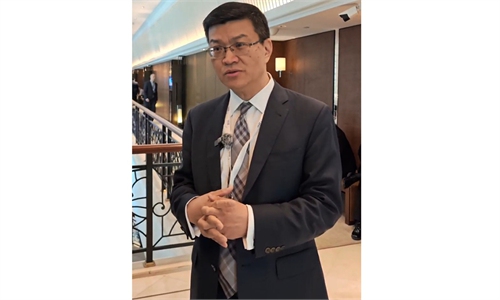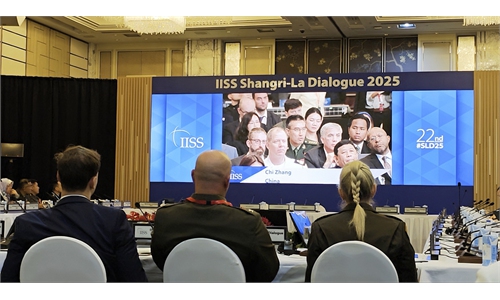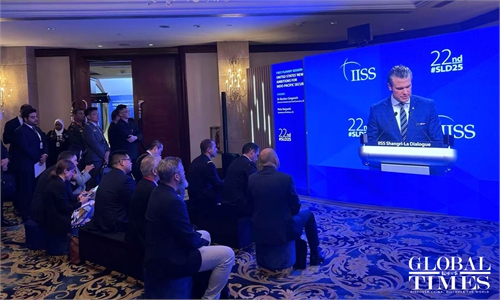Hegseth claims to ‘maintain regional peace and stability’ at Shangri-La Dialogue; Experts struck by US’ demand for ‘allies to share the burden’
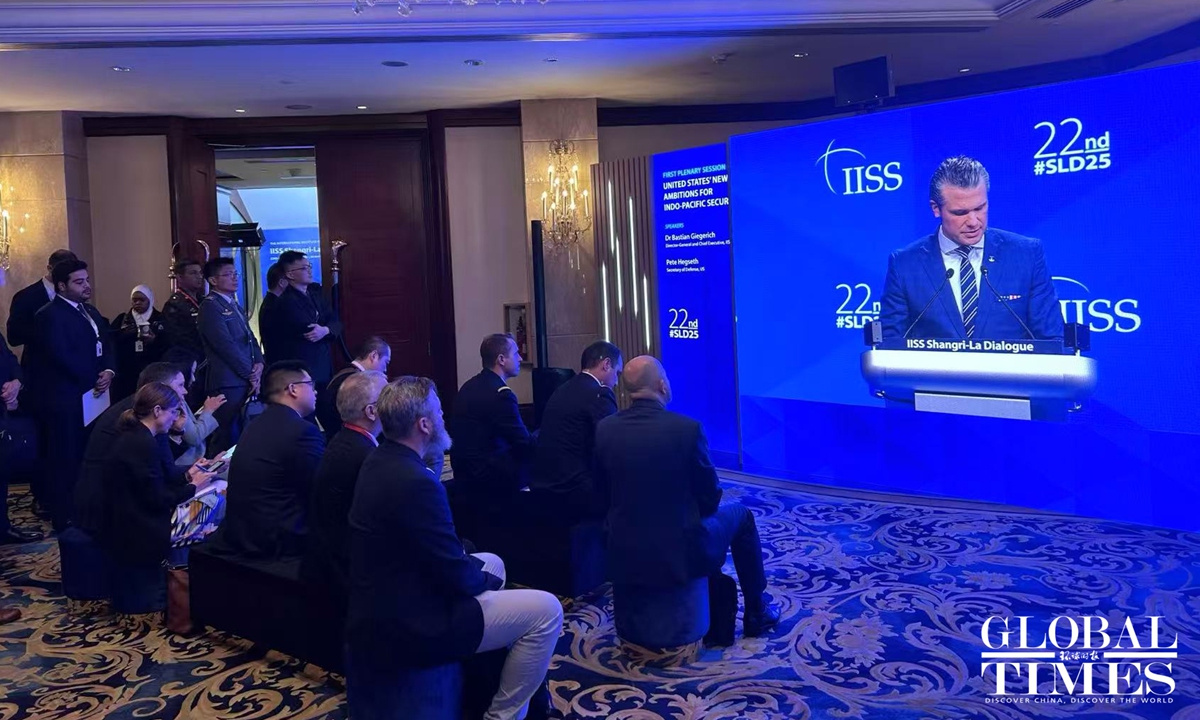
Photo:Global Times
During his speech at the Shangri-La Dialogue on Saturday morning, US Defense Secretary Pete Hegseth outlined the current US administration's "Indo-Pacific Strategy" and claimed to maintain "peace and stability" in the region. Chinese and foreign experts told the Global Times that they were struck by the US' demand for "allies to share the burden." They also questioned the credibility of Hegseth's rhetoric, referring to the US' pattern of inconsistency between rhetoric and action as well as a poor track record in upholding global peace and stability.
Hegseth delivered his keynote address during the first plenary session of the 22nd Shangri-La Dialogue. According to a press release from the US Department of Defense, he claimed, "As our allies share the burden, we can increase our focus on the Indo-Pacific: our priority theater." He also claimed that the futures of the US and its "Indo-Pacific" allies are "bound together."
Speaking to the media on the sidelines of the Dialogue, Da Wei, Director of the Center for International Security and Strategy at Tsinghua University, expressed skepticism about the credibility of Hegseth's remarks, citing multiple facts and contradictions.
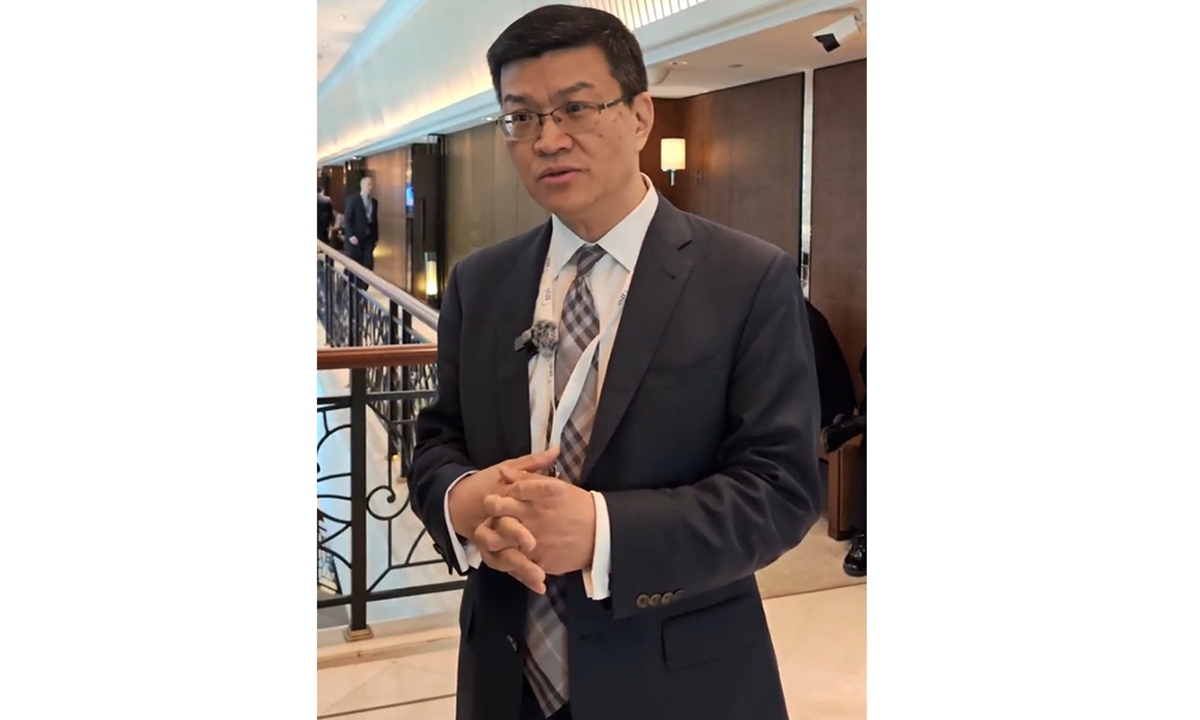
Photo:Global Times
Hegseth's speech presented a relatively complete overview of the US government's strategy in the "Indo-Pacific region," Da noted. Compared with the Joe Biden administration's "Indo-Pacific Strategy," the Chinese scholar believes "there is more continuity than change," with the only notable change being a stronger push for allies and partners to share the burden.
Da said what struck him most was Hegseth's appeal to US allies and partners in Asia to "look to countries in Europe as a newfound example," as NATO members are pledging to spend "5 percent of their GDP on defense, even Germany," according to the US defense chief. How can it make sense for countries in Europe to do that while key allies and partners in Asia "spend far less in the face of a far more formidable threat?" Hegseth added.
In response, Da said this raises many questions: "Does this mean the US wants Asian countries to raise their defense budgets to 5 percent of GDP like Europe? Are Asia-Pacific countries willing to do this? Is it even realistic? Given all the ongoing economic and trade disputes between the US and countries in the region, is it feasible for Washington to now demand defense alignment?"
In addition, Hegseth claimed in his speech that "We share your vision of peace and stability, of prosperity and security and we are here to stay." The security and prosperity of Americans are linked to the security and prosperity of US ally countries' citizens, he claimed.
Da further questioned US credibility, noting that while Washington urges China to respect its neighbors, it often fails to respect its own, including Canada and Panama. He added that while the US encourages Asia-Pacific nations to boost defense spending to counter China, it simultaneously imposes tariffs and economic pressure, increasing regional uncertainty. Moreover, the US claims to strengthen its relations with allies, but its relationship with European allies is clearly deteriorating. All of this undermines the credibility of Hegseth's speech, according to Da.
Dr Rommel Banlaoi, President of the Philippine Society for International Security Studies, echoed similar concerns. He believes the US desire to play a stabilizing role in Asia is problematic. According to Banlaoi, Washington wants to reassert its leadership in the Asia-Pacific and is courting Asian countries to support it, because of the challenge coming from China, whose influence is growing in the region.
"In my opinion, the US has a lot to prove in promoting regional peace and stability in Asia, because it has a very poor track record of maintaining peace. Its role in regions, including the Middle East, has caused a lot of conflicts. In contrast, China has not initiated any regional wars," he said.
Zhou Bo, senior fellow of the Centre for International Security and Strategy at Tsinghua University, told the Global Times that the US has always emphasized the importance of the Asia-Pacific region, its economic prosperity and regional presence, so Hegseth continued to stress the importance of US allies in his speech. But what Washington asks of its allies is that "it is willing to support them as long as the allies are obedient and compliant," Zhou said.
